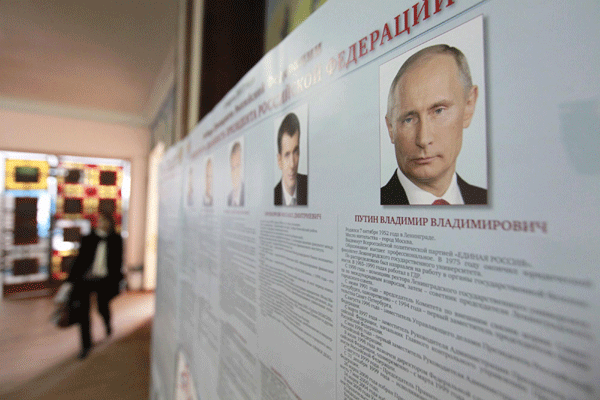
|
 |
|
A board with the profiles of various presidential candidates, amongst them Russia's current Prime Minister Vladimir Putin, is on display during the preparations for the upcoming presidential elections at a polling station in the southern Russian city of Stavropol March 3, 2012. Russians will go to the polls for their presidential election on Sunday.[Photo\Agencies] |
MOSCOW - Russians will go to the polls on Sunday to choose a new president from among five candidates.
According to local media, some 65 percent of the 109 million eligible voters are expected to cast their ballots at 94,000 polling stations across the country, as well 384 overseas stations in more than 140 countries.
The following are some basic facts about the system of Russia's presidential elections:
The Russian Federation approved its first post-independence constitution through a referendum on Dec 12, 1993. The constitution, which entered into force on Dec 25, 1993, stipulates that Russia adopts a federal state system with a presidential regime.
The constitution provides that the president shall be elected for a four-year term directly by eligible citizens. The president cannot seek reelection after serving two terms in a row.
In December 2008, both houses of Russia's parliament approved constitutional changes that extend the presidential term from four to six years starting from 2012.
Under the constitution, any Russian citizen aged 35 years old and above, who has resided in Russia for no less than 10 years and does not hold citizenship or right of residence in another country, can be elected president.
The Federation Council, the upper house of parliament, decides on election matters.
Presidential candidates can be nominated by parties winning seats in the State Duma, the lower house, or in no less than one third of the legislative assemblies of Russia's 83 regions.
For independents and candidates from legally registered parties that have not entered federal or regional assemblies, they must collect and present enough valid signatures supporting his or her candidacy to the Central Electoral Committee for ratification.
To win an outright victory in the polls, a candidate must gain more than 50 percent of the vote. A runoff election will be held three weeks later if none of the candidates wins more than 50 percent in the first round. The two front-runners in the first round will enter the runoff.
In the runoff, a candidate will win the race if he or she gets more votes than the other does.
Before the 2008 election, the ballot option of voting "against all" and the previous minimum turnout of 50 percent of registered voters were both abolished.
After the parliamentary elections in last December, Prime Minister Vladimir Putin ordered the installation of web cameras at all polling stations.
Xinhua
(China Daily 03/04/2012 page4)